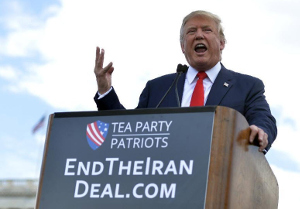President Trump started his long-anticipated anti-Iran speech by complaining about the 1979 hostage situation. What followed was an increasingly fantastical and absurd accounting of Iran’s history, before finally announcing he is decertifying the nuclear deal for “violations,” and announcing new sanctions.
 The allegations against Iran went from things that happened a generation ago to treating things like the specious “Iranian plot” to attack a DC restaurant as not only the government’s fault, but absolute established fact. Beyond that, he blamed Iran for the ISIS wars in Iraq and Syria, repeatedly accused them of supporting al-Qaeda, and claimed Iran was supporting the 9/11 attackers.
The allegations against Iran went from things that happened a generation ago to treating things like the specious “Iranian plot” to attack a DC restaurant as not only the government’s fault, but absolute established fact. Beyond that, he blamed Iran for the ISIS wars in Iraq and Syria, repeatedly accused them of supporting al-Qaeda, and claimed Iran was supporting the 9/11 attackers.
The allegations were so far-fetched by the end, that even President Trump appeared cognizant that many won’t be taken seriously. Later in his speech, he insisted that the claims were “factual.”
When addressing “violations” of the P5+1 nuclear deal, Trump similarly played fast and loose with the facts, citing heavy water claims that are really more the international community’s violation than Iran’s (Iran was guaranteed an international market for the water, but after Congress got mad the US has refused to buy any more, meaning Iran’s totally non-dangerous stock grew), and accusing them of “intimidating” inspectors, insinuating that was the reason there aren’t investigations at Iranian military sites.
In reality, Iranian military sites are only subject to investigation in the case of a substantiated suspicion of nuclear activities, and there simply are none. The IAEA has in recent days clarified multiple times that they don’t need or want to visit any military sites right now. The only allegations about the sites are from the Mujahedin-e Khalq, which has been the source of repeated false accusations in the past.
And while this was supposed to be a speech about the nuclear deal, Trump closed it off with comments that very much sound like his goal is regime change, saying Iran’s people want to be able to interact with their neighbors (despite Iran being on very good terms with most of its neighbors already), and suggesting that whatever he’s going to do will lead to “peace and stability” across the Middle East.


